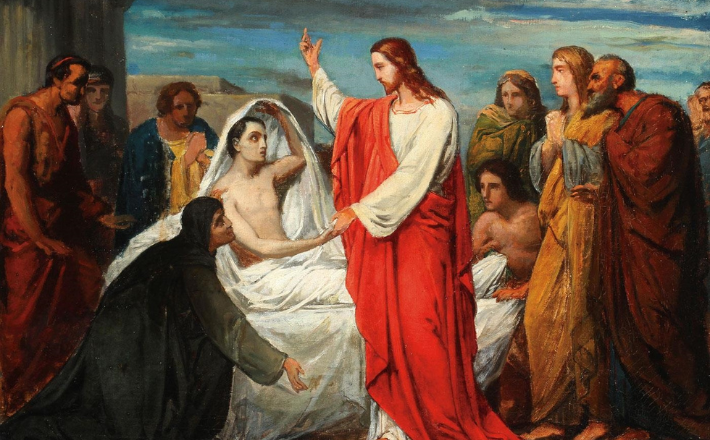Commentary on Luke 7:1-17
Was the centurion exhibiting deference to Jesus? Was he trying to be polite by sparing him from coming directly to his estate to heal his slave in person? Did the centurion recognize the power of Jesus? Was he embarrassed at the thought of Jesus coming to him? Or did the centurion not want Jesus to visit him because he felt that Jesus was beneath him?
In Luke 7:1–10 it is not entirely clear, though in the end Jesus applauds the faith of the centurion and heals his slave as he had requested.
It might be hard to imagine Jesus praising a soldier, someone whose job it is to kill in order to protect the interests of the Roman Empire. And a centurion was no ordinary soldier. The centurion in Luke led a battalion of 100 men, called a centuria. The centuria was a fraction of a 6,000-soldier legion. Ten cohorts of six centuria formed a legion commanded by some 60 centurions. If he had slaves and enough influence to compel Jewish leaders to heal a favorite slave, then the centurion of Luke excelled at protecting the interests of the empire. He likely excelled at state-sanctioned killing.
Additionally, the Jewish elders who implore Jesus to help the centurion describe the centurion as worthy because he built a synagogue for them and purportedly loves the Jewish people. Why then does the centurion work for the empire that controls them? And is worthiness to be healed by Jesus—or to benefit from Jesus’ healing of one’s slave—measured by the construction of public and ritual spaces such as a synagogue? Is the rationale of the Jewish elders theologically sound?
Why would Jesus want to help someone like him?
The passage does not provide an answer. We only know that Jesus marveled at the centurion. The Greek here is hethaumazein from thaumazo, and can even be rendered “admired.”
Perhaps a key takeaway from the passage about Jesus and the centurion whose slave Jesus heals is not so much the way in which the centurion saves Jesus from troubling himself to heal the slave in person. It is not the clever parallelism the centurion draws between his ability to give orders from afar and have them followed and the assurance that Jesus could do the same if he is who he says he is. It is not the faithfulness of the centurion that Jesus perceives. Perhaps a key takeaway is, rather, the astonishing marvel or admiration Christ expresses for the centurion’s perceived faithfulness.
No matter who we are, even if what distinguishes us is excellence in the art of defending and propagating the empire with lethal violence, even if the reason people revere us is because we have purchased their respect, we are still worthy of the marvel and admiration of Christ.
Christ has compassion on everyone, including those who embody the power to whom truth speaks.
Jesus also has compassion that arises out of his own initiative.
In the passage that begins at Luke 7:11, the woman of Nain whose son has died does not seek Jesus. She may not have even known who Jesus was. Her mind was likely far from considering whether a Messiah was near because she was surrounded by a crowd and grieving for her dead son whose body was being processed through town.
“Do not weep,” Jesus says to her, then he reaches out and just manages to touch the stand the bearers are holding and on which the body lies. The procession halts. “Young man, I say to you, rise!” says Jesus.
The corpse sits upright and speaks. Jesus presents him to his mother. The detached mourners recalibrate their focus on whom they deem a prophet in their midst. The reputation of Jesus spreads as a great prophet able to bring the dead back to life.
The resurrection demonstration from Jesus in Luke 7 indicates the Messiah’s power over life and death. Jesus is not merely a great prophet; he’s the Son of God and Son of Humanity. Though he reaches for the bier, his address to the corpse is a simple sentence without strain, and a miracle like no other occurs. It foreshadows Jesus’ own resurrection, and subtly communicates that. A mother receives back her son without even having to ask. Christ decides in the midst of her agony and grants a reunion that can scarcely be believed.
References
Francois Bovon, Luke 1: A Commentary on the Gospel of Luke 1:1–9:50, Hermeneia (Fortress, 2022).
“Centurion: Roman Military Officer,” Encyclopedia Britannica, accessed September 27, 2024, https://www.britannica.com/topic/centurion-Roman-military-officer.
PRAYER OF THE DAY
Healing Lord,
By your goodness you healed many who were ill, even raising the dead to life. Restore us to new life, healing our hearts, minds, and spirits, so that we may proclaim praise and gratitude for your compassion to all who will hear. In the name of the one who is himself new life, Jesus Christ our savior. Amen.
HYMNS
Take my life, that I may be ELW 583, 685, H82 707, UMH 399, NCH 448
Healer of our every ill ELW 612
CHORAL
God’s son has made me free, Edvard Grieg


February 9, 2025